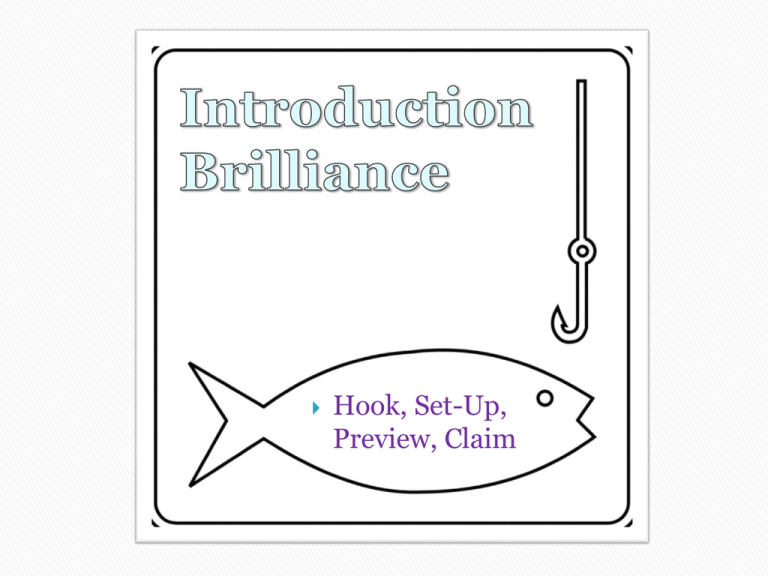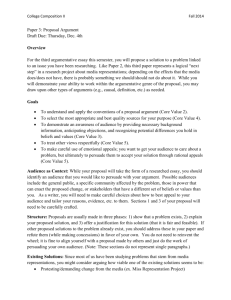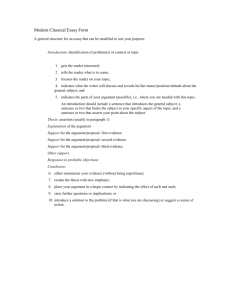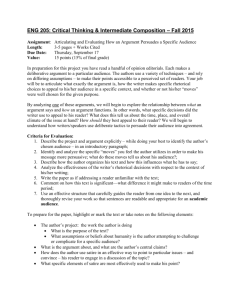Introduction
advertisement

Hook, Set-Up, Preview, Claim Hook the Reader’s Interest Show That the Topic Is Significant Establish the Context/Problem Introduce the Main Claim Preview the Argument to Come a) Attention grabbing facts and statistics - alone or in combination with one of the following strategies b) A story (real or hypothetical) or a case study - can move, intrigue or shock the reader c) d) An example - illustrates something at the heart of the argument The moment before the moment – dramatically sets the stage by showing the reader how something important changed 9/11/2001 8:45 a.m. Show that a phenomenon is widespread and important – the percentage of Americans who suffer from eating disorders, number of acts of violence in an episode of a children’s show, number of teen pregnancies in 2011, number of bottled waters sold in 2010 Show that something is changing – increase in unemployment, increase in cost of college tuition, decline in the number of glaciers in Glacier National Park since 2000 Compare or contrast two things – deaths from heart disease and deaths from cancer; number of anticipated new job openings in a field and the number of estimated new graduates in that field A well-chosen, well-told story or case study enables the reader to “relate” to the topic in a personal way AND introduces the main concepts and concerns of the argument Case studies should be real A story can be real or hypothetical – tell the reader which it is The story or case study should only include details relevant to the paper Includes all the working parts of the claim Is about someone or something that is an accurate example for your argument Works well in combination with facts and statistics Warning: Too few details results in a weak effect and/or allows too much for reader interpretation Warning: Including lots of extraneous details confuses and even irritates the reader Warning: Using an exceptional case undermines your argument Examples, like stories, give the reader something to “visualize” and relate to It is up to you to describe the example in ways that draw the reader’s attention to the characteristics that matter to your paper Examples can be people, places, things, events, visual images, TV shows, music lyrics, books and other text, etc. Examples work when you point out to the reader what he/she/they should notice Examples have maximum effect if you continue to refer to them in the body of your paper Examples work well with facts and statistics Different introduction strategies should be combined in a seamless way Combining a story/case study or an example with facts and statistics ◦ Jane is one of ________ Americans who has experienced _______ - transitions from specific to general ◦ Fifty million Americans have endured _________. Like those Americans, John suffered ________ - transitions from general to specific Use similar techniques with examples Sets the stage for a dramatic change by telling the reader what it was like before something happened. ◦ At 8:45 a.m. on 9/11/2001 Americans still believed that American soil was safe. At 8:46, flight 11 slammed into the World Trade Center and everything changed. Important topics are worth reading about A topic is important because its effects are widespread A topic is significant because its effects cause serious harm A topic is significant because its effects cause serious benefits A topic is significant because failing to pay attention will have serious consequences It is not enough to say that your topic is important – you must demonstrate it Facts and statistics are the easiest way to demonstrate significance Claims by highly credible experts can also be helpful – but be careful of biased sources! It is enough to show that a topic is significant to a particular group – everyone in the world does not have to care Present the cultural, historical, and/or other backdrops against which you are making your argument ◦ Examples: Current popularity of organic food; recent nuclear power plant accidents; rising popularity of hybrid vehicles Locate the leading edge research on which your project has focused ◦ Language like: Until recently scientists thought …; Although many believe …; Recent studies have shown _____ but the question of ______ remains open; Recent research has focused on ________ but failed to adequately explore ________. Contextual information can be presented in more detail early in the body of the argument – do not take up too much time in the introduction Like other introductory material, contextual information should be concisely delivered – enough detail but not too much Introduce the Main Claim near the end of the introduction so that the reader will remember it as the argument begins The acknowledgement, or “Although” clause, should be closely related to your argument and introduction Once your draft is complete, make sure that the Main Claim is what you actually argued in the paper The typical reader wants a general roadmap The “becauses” associated with the Main Claim preview the argument to come The preview may be presented in several sentences that follow the Main Claim The preview should not present specific evidence





![Program`s Dynamic Criteria Map (DCM)[1]](http://s3.studylib.net/store/data/007112770_1-0a2faad44b8e94d6ea99c5f4cbf00e83-300x300.png)
